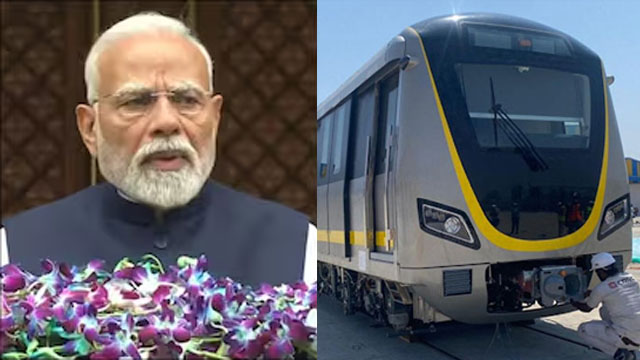Daijiworld Media Network - Bengaluru
Bengaluru, Aug 3: In a major infrastructure milestone for Karnataka's capital Bengaluru, Prime Minister Narendra Modi is set to inaugurate the much-anticipated yellow line of Namma Metro and launch the ambitious phase-3 expansion on August 10.
The 19.15-km-long yellow line, stretching from R V Road to Bommasandra, comes at a cost of Rs 5,056.99 crore and features 16 stations. The corridor is expected to provide a massive relief to daily commuters, particularly those navigating the congested Silk Board Junction, and is estimated to serve up to eight lac passengers daily.

Marking a key step in Bengaluru’s public transportation evolution, the prime minister will also lay the foundation stone for Phase-3, a Rs 15,611-crore expansion project aimed at extending the Metro by 44.65 km. The new phase includes two new corridors with 31 stations, connecting J P Nagar 4th Phase to Kempapura (Hebbal) and Hosahalli to Kadabagere, improving connectivity along Magadi Road and Outer Ring Road’s western stretch.
Notably, a section of this expansion will feature double-decker viaducts, with Metro tracks running above existing flyovers, optimising urban space.
Union minister for home and urban affairs, Manohar Lal Khattar, confirmed the visit, stating, “The Hon’ble Prime Minister has kindly agreed to inaugurate the yellow line and lay the foundation stone for Phase-3 on August 10.”
Bengaluru South MP Tejasvi Surya hailed the development as a “landmark moment” for Bengaluru. “With nearly Rs 20,000 crore worth of Metro infrastructure directed to this region, we thank PM Modi for his vision and continued support towards strengthening Bengaluru’s mobility landscape,” he said.
The dual projects — yellow line and phase-3 — are projected to benefit over 25 lac commuters, significantly enhancing urban mobility and connecting key residential and industrial hubs such as Electronic City.
On August 1, the Commissioner of Metro Railway Safety (CMRS) gave the much-awaited safety clearance to the yellow line, allowing the Bangalore Metro Rail Corporation Limited (BMRCL) to proceed with commercial operations. The line comes into service nearly eight years after civil works were first awarded in 2017.
Currently, BMRCL has three train sets stationed at the Hebbagodi depot, with the fourth en route to the city. The yellow line had suffered years of delay owing to multiple logistical and geopolitical issues.
Originally contracted to Chinese firm CRRC, the project was stalled after the company failed to meet the 'Make in India' local manufacturing norms. The situation worsened following the India-China border standoff in 2020, FDI policy changes, and pandemic-related hurdles.
In a significant turnaround, CRRC partnered with Titagarh Rail Systems, a Bengal-based firm, to manufacture coaches domestically. Even then, visa delays for Chinese engineers and late arrival of propulsion systems from Japan further delayed testing and commissioning.
Despite the setbacks, Bengaluru now stands on the brink of a Metro transformation — a move likely to change the face of daily commuting in the IT capital.